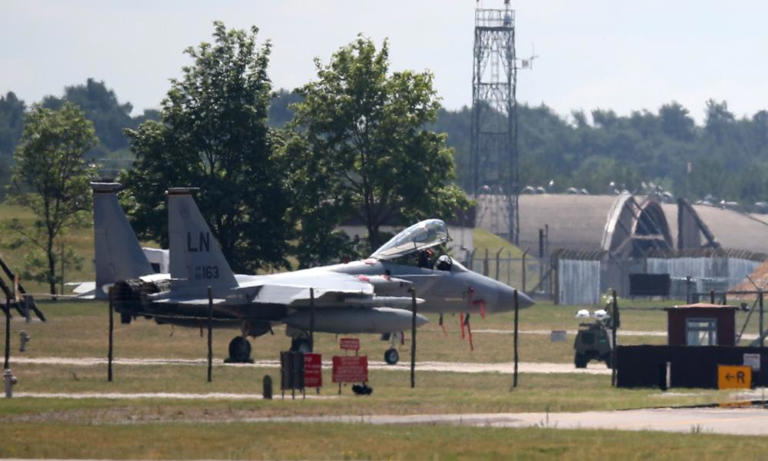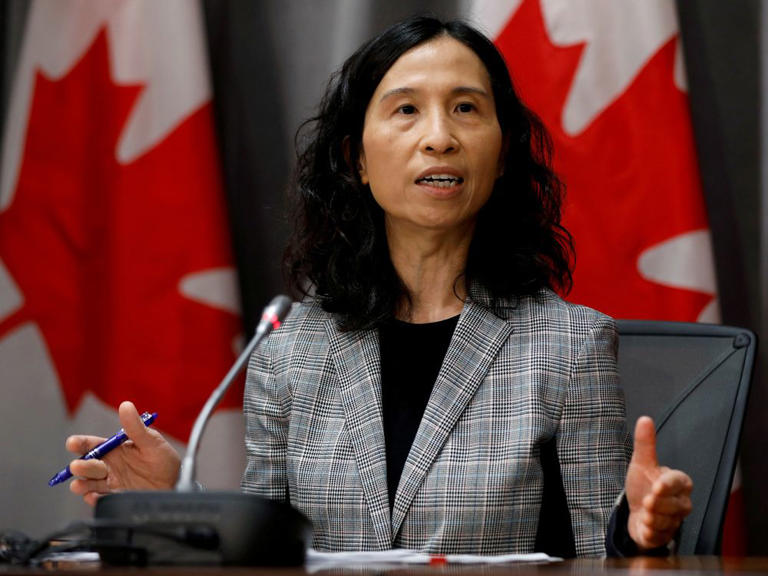TO SAY NOTHING OF NUKES IN BELARUS
Story by Julian Borger and Andrew Roth •The Guardian

Photograph: Chris Radburn/AFP/
The Russian foreign ministry has said Moscow will view any move to return US nuclear weapons to the UK as an escalation and will respond with “countermeasures” for its own security.
The foreign ministry spokesperson Maria Zakharova was responding to a report last week about an item in the 2024 US air force budget for building a dormitory at RAF Lakenheath in Suffolk for personnel on a “potential surety mission” – military jargon for nuclear safety and security. It raised the prospect of the return of US nuclear weapons to British soil for the first time in more than 15 years.
“If this step is ever made, we will view it as escalation, as a step toward escalation that turn to UK? Evidence suggests process underwaywould take things to a direction that is quite opposite to addressing the pressing issue of pulling all nuclear weapons out of European countries,” Zakharova said.
Related video: US nukes to return to UK? Evidence suggests process underway (WION)
“In the context of the transition of the United States and Nato to an openly confrontational course of inflicting a ‘strategic defeat’ on Russia, this practice and its development force us to take compensating countermeasures designed to reliably protect the security interests of our country and its allies.”
The US is estimated by the Federation of American Scientists (FAS) to have 100 B61 gravity bombs deployed in Europe and another 100 B61s – the only tactical weapon in its arsenal – in storage in the US. If US nuclear weapons were sent back to Lakenheath, they would almost certainly be a modernised version of the B61.
FAS estimates Russia has 1,816 tactical, or non-strategic, weapons (shorter range and intended for use in battle rather than for the destruction of whole cities). These have been held until now in storage facilities, but Vladimir Putin announced in June that some nuclear warheads would be deployed in Belarus within a month. There has so far been no confirmation by western intelligence that they have been moved.
The warheads are intended for use on Belarus Iskander missile launchers or as bombs to be dropped by Belarusian Su-24 or Su-25 jets. If the transfer is carried out, it would be the first time Moscow has put nuclear weapons in the hands of allies since the collapse of the Soviet Union.
Matt Korda, a senior research fellow at the FAS nuclear information project who first spotted the US budget item for a surety dormitory at Lakenheath, said: “While the potential return of US nuclear weapons to UK soil certainly merits scrutiny, it’s a bit rich to see it coming from a government who has spent the past year initiating the exact same thing with Belarus.
“It’s highly unlikely that the Russian government would describe its own nuclear sharing arrangements in Belarus as escalatory or destabilising and yet the parallels between the two situations are clearly visible.”
Story by Julian Borger and Andrew Roth •The Guardian

Photograph: Chris Radburn/AFP/
The Russian foreign ministry has said Moscow will view any move to return US nuclear weapons to the UK as an escalation and will respond with “countermeasures” for its own security.
The foreign ministry spokesperson Maria Zakharova was responding to a report last week about an item in the 2024 US air force budget for building a dormitory at RAF Lakenheath in Suffolk for personnel on a “potential surety mission” – military jargon for nuclear safety and security. It raised the prospect of the return of US nuclear weapons to British soil for the first time in more than 15 years.
“If this step is ever made, we will view it as escalation, as a step toward escalation that turn to UK? Evidence suggests process underwaywould take things to a direction that is quite opposite to addressing the pressing issue of pulling all nuclear weapons out of European countries,” Zakharova said.
Related video: US nukes to return to UK? Evidence suggests process underway (WION)
“In the context of the transition of the United States and Nato to an openly confrontational course of inflicting a ‘strategic defeat’ on Russia, this practice and its development force us to take compensating countermeasures designed to reliably protect the security interests of our country and its allies.”
The US is estimated by the Federation of American Scientists (FAS) to have 100 B61 gravity bombs deployed in Europe and another 100 B61s – the only tactical weapon in its arsenal – in storage in the US. If US nuclear weapons were sent back to Lakenheath, they would almost certainly be a modernised version of the B61.
FAS estimates Russia has 1,816 tactical, or non-strategic, weapons (shorter range and intended for use in battle rather than for the destruction of whole cities). These have been held until now in storage facilities, but Vladimir Putin announced in June that some nuclear warheads would be deployed in Belarus within a month. There has so far been no confirmation by western intelligence that they have been moved.
The warheads are intended for use on Belarus Iskander missile launchers or as bombs to be dropped by Belarusian Su-24 or Su-25 jets. If the transfer is carried out, it would be the first time Moscow has put nuclear weapons in the hands of allies since the collapse of the Soviet Union.
Matt Korda, a senior research fellow at the FAS nuclear information project who first spotted the US budget item for a surety dormitory at Lakenheath, said: “While the potential return of US nuclear weapons to UK soil certainly merits scrutiny, it’s a bit rich to see it coming from a government who has spent the past year initiating the exact same thing with Belarus.
“It’s highly unlikely that the Russian government would describe its own nuclear sharing arrangements in Belarus as escalatory or destabilising and yet the parallels between the two situations are clearly visible.”


 cbc.ca
cbc.ca


